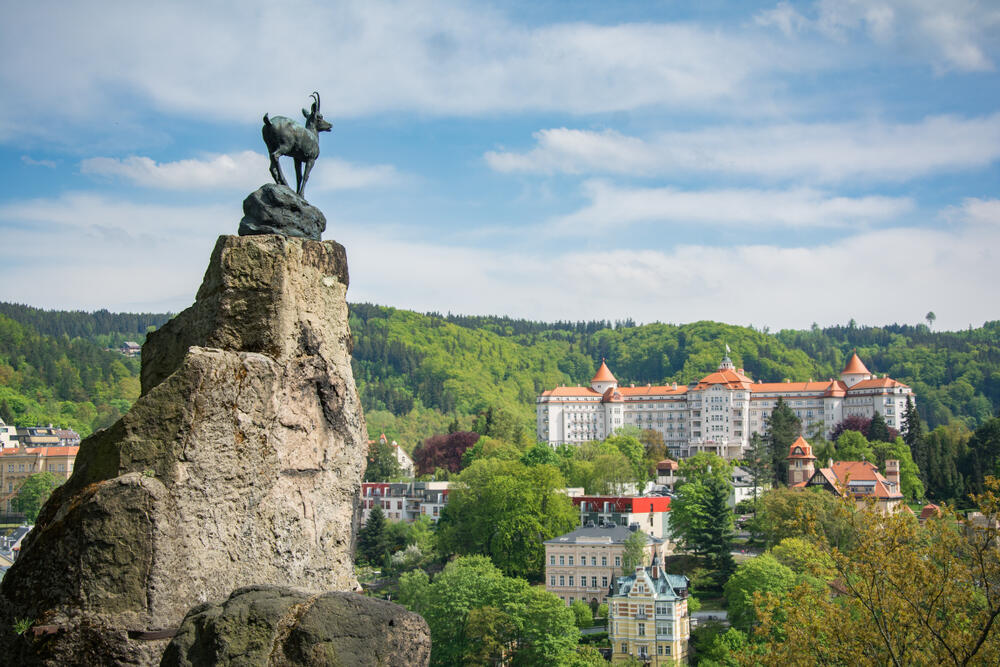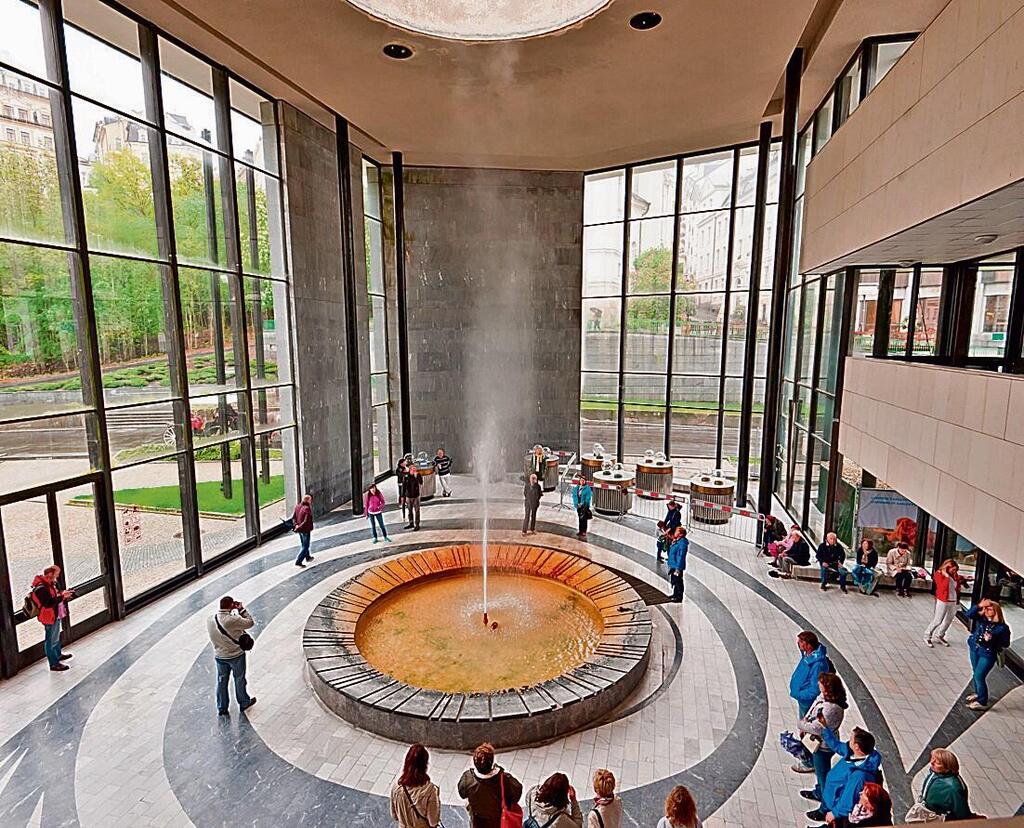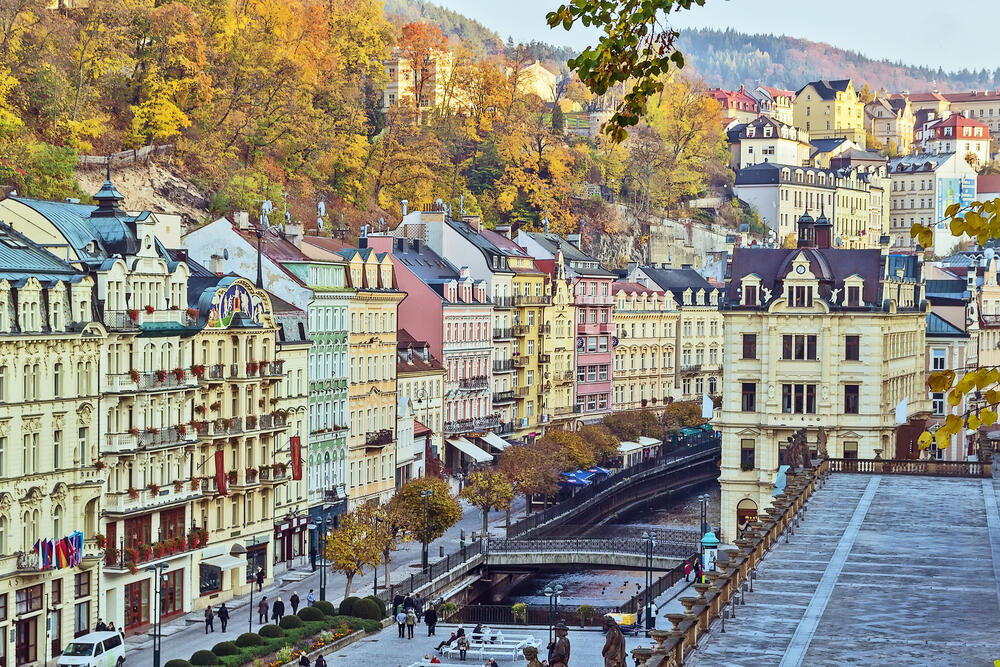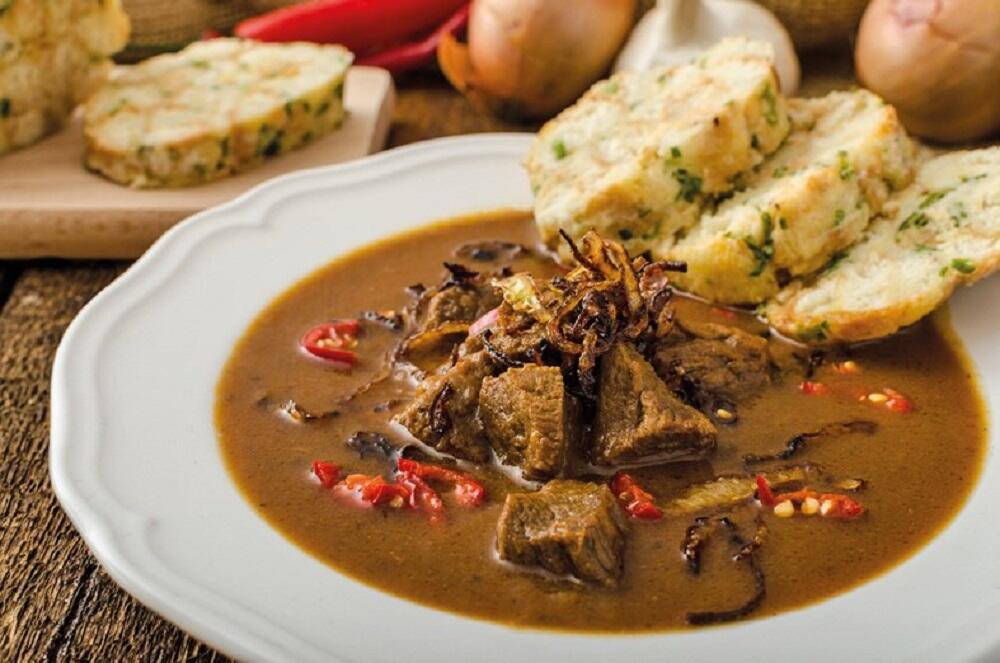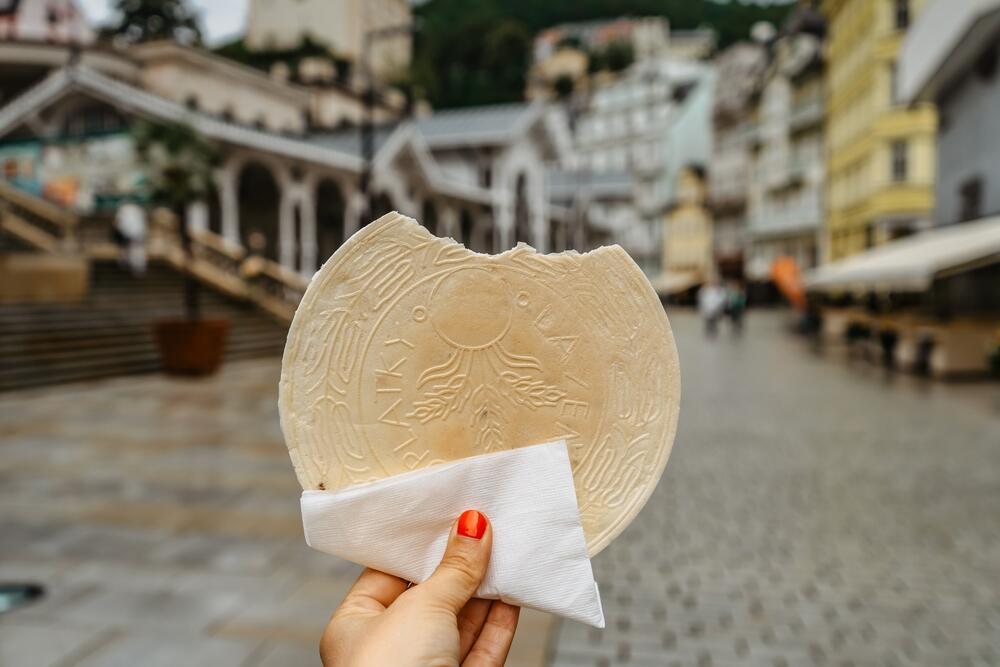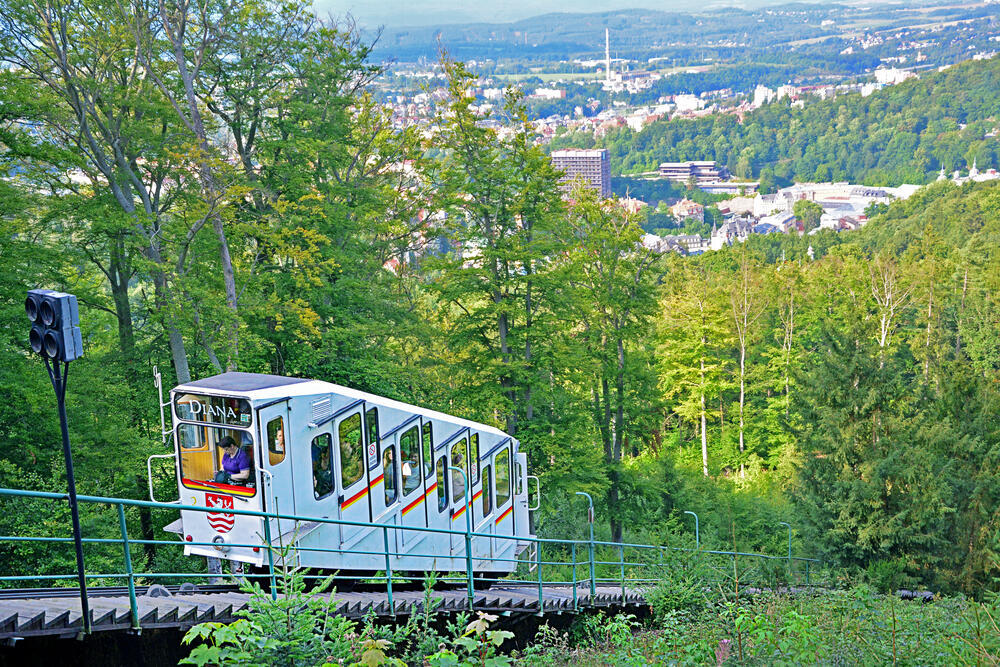Getting your Trinity Audio player ready...
Picturesque, kitschy and elegant - these are just a few of the descriptions commonly used to depict Karlovy Vary, the Czech spa and resort town. Indeed, spending time in this stunning city, located 80 miles west of Prague, offers a perfect escape - as if stepping into a bygone era or a magical fairy tale.
Nestled in the greenery of Western Bohemia, Karlovy Vary has become a favorite among Israeli tourists. Some make a day trip from Prague, while others come for extended stays to enjoy treatments, massages and pampering. Many hotels even display the blue-and-white flag, catering to religious visitors.
Here is a selection of recommendations that will make you want to visit the town.
Fountain of youth
In 2021, UNESCO declared Karlovy Vary a World Heritage site, recognizing its twelve thermal baths, with temperatures ranging from 39-73 ℃ (102-163℉), for their healing properties. According to legend, Emperor Charles IV discovered the first spring in the 14th century during a hunting expedition, which explains why the city was known as Karlsbad for many years.
During the Belle Époque, from the late 19th to early 20th century, spa tourism flourished, and now many hotels (such as those along Sadova Street or the Tepla River) and numerous sites offer spa services, treatments and bathing in springs and pools.
Notable names include the imposing Thermal hotel (a stark remnant of the communist era) which serves as a complex for medicine, cosmetics, shopping and entertainment, the Mill Colonnade supported by 124 Corinthian columns and adorned with allegorical reliefs and SPA5, a complex of pools, massages and treatments.
What to drink?
While Karlovy Vary’s alcoholic trifecta of Czech beer, Becherovka and Aperol Spritz garners respect, the most consumed beverage here is the mineral water from the hot springs. These waters are reputed to improve metabolic functions and ailments of the digestive system, liver and kidneys.
Throughout the city, there are numerous fountains where visitors queue up with personal bottles and cups, often colorful and ornate porcelain mugs with spouts, available for purchase at shops and sales stands. It’s worth noting that the taste of the water (each spring has its own flavor) can be off-putting: some claim it is bitter or salty, while others say one spring even has a smell reminiscent of rotten eggs.
Remnants of a glorious Jewish heritage
Since the 16th century, Jews have frequented the healing baths of the city. In the 19th century, a kosher restaurant was established where the Rothschild family dined, and a hostel for impoverished Jewish patients was founded.
For centuries, Jews faced resistance in settling in the city. It wasn't until Emperor Franz Joseph I's decree in 1849 that they could do so. The city then attracted wealthy Jewish families, and in 1877, a beautiful Romanesque-Moorish-style synagogue was inaugurated, featuring a large central dome and two side domes. Under Rabbi Prof. Ignatz Ziegler's leadership, the Jewish community flourished, deeply integrated into the city's cultural life.
The city also holds a significant place in Zionist history, hosting the World Zionist Congress twice, in 1921 and 1923. However, in 1938, after the Munich Agreement, the Sudetenland was annexed by Nazi Germany. During Kristallnacht in November 1938, the synagogue was burned down, and Jewish property was confiscated. Most of the city's Jewish population perished in the Theresienstadt and Auschwitz death camps.
After the war, some survivors returned. During the communist era, the community faced persecution from the secret police. After the fall of communism, the community began to recover, reclaiming several buildings. One of these now houses a synagogue at Bezručova 1321/8. A memorial stands at the former synagogue site on Sadová Street, featuring a Star of David with the inscription: "In eternal memory of our victims during the Nazi regime and our heroes who fell in World War II."
Visitors can also explore the old Jewish cemetery, founded in the late 19th century, located at Mozartova ulice. Kosher food is available at the Shalom restaurant.
Karl Marx and the Golden Church
Ironically, at the top of Sadová Street, the Russian Orthodox St. Peter and Paul Cathedral stands near a statue of Karl Marx, the German-Jewish philosopher and revolutionary who wrote the Communist Manifesto and coined the phrase "religion is the opium of the masses."
While the bronze statue of Marx, who visited Karlovy Vary several times, was erected in 1988, the church, designed in Byzantine style, was inaugurated 90 years earlier. The recently renovated church boasts five golden onion domes and a bright blue exterior ceiling, visible from afar. Its interior is equally impressive, adorned with numerous artworks and stained glass windows. The church is open to the public from 9 a.m. to 6 p.m., with entry via Petr Veliký Street.
Crispy ducks and venison goulash
Czech cuisine might not be synonymous with gourmet dining, but I have a soft spot for its hearty, comforting and calorie-rich dishes. Think roasted ducks and geese, beef goulash, venison stews, rabbit roasts, generous schnitzels, liver dumpling soups and sides like dumplings, various potato dishes and cabbage delicacies. Karlovy Vary boasts several commendable restaurants offering high-quality traditional Czech food.
Among them, Embassy (+420 353 221 161) stands out. Established in 1938 within the hotel of the same name, its wood-paneled interior and vintage furnishings have hosted numerous Hollywood and European stars, earning it a legendary status.
Another favorite of mine is Charleston (+420 353 230 797), where you can indulge in both local cuisine and a selection of French (including foie gras and steaks) and Italian dishes (fantastic pastas).
In recent years, more restaurants have been offering modern and creative takes on traditional cuisine. TUSCULUM (+420 739 541 120) excels in using seasonal ingredients, while the romantic Promenáda (+420 353 225 648) adds innovative twists to dishes like duck, poultry, and venison. The trendy new La Hospoda (+420 730 197 297), with its spacious terrace, serves up sexy modern Czech cuisine and excellent beers.
The most prestigious and acclaimed spot in town is Le Marché (+420 730 133 695), led by renowned chef Jan Krajč. It is famous for its six-course tasting menu (including fish and seafood) with occasional Asian influences, such as duck in coconut milk.
For those seeking different flavors, the city also offers a variety of ethnic restaurants, from Asian to Mediterranean, alongside fast-food joints like McDonald's and pizzerias. However, be cautious of the numerous tourist traps scattered around the city.
The national waffle
Strolling through the city, you'll likely see many people munching on thin, round waffles (about 12 inches in diameter). These waffles are one of Karlovy Vary's most iconic and traditional symbols, sold at stands and shops on every corner. They make a perfect souvenir or gift for tourists. Several companies produce them, but the original and most famous is karlovarské oplatky, which has been making them since 1788 using thermal spring water to enhance their flavor. Notable fans included Russian Tsar Peter the Great, composer Wolfgang Amadeus Mozart and poets Johann Wolfgang von Goethe and Friedrich Schiller.
These exported waffles come in various sizes (including triangles) and flavors such as chocolate, vanilla, hazelnut, almond, coffee, lemon, coconut, cinnamon and even a hint of hot pepper. The company also operates a restaurant-cafe shop adjacent to the Thermal Hotel.
Quality shopping
The streets of Louka and Nová Louka, flanking the river, are a shopping paradise, featuring well-known, accessible, and beloved brands alongside Czech companies. Particularly notable are the stores offering high-end fashion from designers like Versace and Gucci. Jewelry stores also adorn the streets, including the Swiss brand Chopard. It's worth noting that you should bring Czech crowns, as not all places accept euros, though credit cards are widely welcomed.
Stars in the Bohemian sky
Every July, Karlovy Vary hosts an international film festival, renowned as one of the most prestigious, long-standing and respected events on the global festival circuit. Over the years, numerous Hollywood stars have graced the red carpet. A partial list includes John Travolta and Uma Thurman of Pulp Fiction fame, Helen Mirren, Judi Dench, Jamie Dornan, Benicio Del Toro, Liev Schreiber, Geoffrey Rush and even Richard Gere and Johnny Depp.
Synchronize your visit with the festival to enjoy films and see stars attending premieres, tributes, masterclasses and engaging with the public. The festive atmosphere includes free parties and performances. The festival has a fondness for Hebrew cinema, with several Israeli films winning the prestigious Crystal Globe award for best film.
Grandhotel
For those who can afford it, the Grandhotel Pupp is highly recommended. Part of it was built in the early 18th century. Its illustrious guest list includes figures like Napoleon Bonaparte, Sigmund Freud, the legendary lover Casanova, leading classical composers and Hollywood stars (Sharon Stone, Antonio Banderas, Robert De Niro, Robert Redford, Susan Sarandon).
The hotel has 228 rooms; those from the 18th century offer an elegant, classic atmosphere with antique furnishings, while the newer rooms facing the park are designed in a modern style. The hotel features a fine dining restaurant with a smart casual dress code, a casino, a club, and a dimly lit bar. Even if you are not a guest, it’s worth visiting the hotel and enjoying its attractions.
At the top of the hill
No visit to Karlovy Vary is complete without a trip to Diana Hill. You can reach it on foot or by funicular, which departs near the Grandhotel Pupp. At the top, you'll find the Diana Observation Tower, inaugurated in 1914. Climb its 150 steps to enjoy breathtaking views of the lush, green landscape.
The Diana complex, open year-round except in January, features a restaurant known for its grill section, venison, and kids' menu, a small zoo and a butterfly house. Details and opening hours.
Castles, skiing and golf
"It’s best not to stay only in Karlovy Vary," suggests Petr Kulhánek, Governor of the Karlovy Vary Region. "There are many castles, nature reserves, and forests worth visiting. Golf enthusiasts will find plenty to do with 15 golf courses in the region. You can also boat down the rivers or go horseback riding. The Ore Mountains, just a 25-minute drive away, are highly recommended. In summer, you can bike and climb, and in winter, the mountains are ideal for skiing."


